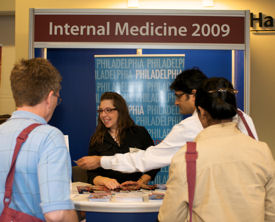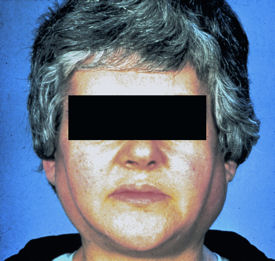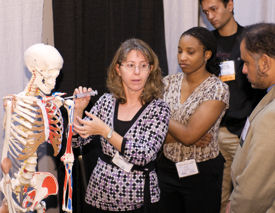Internal Medicine mixes new offerings with old favorites
Clinical news inspired new offerings at this year's annual meeting, but so did current event, with sessions planned on President Barack Obama's first 100 days and the influence of Islam on modern medicine.
Like its host city Philadelphia, Internal Medicine 2009 will offer a blend of the new and the established in its courses and activities for internists. The meeting kicks off April 21-22 with pre-courses and continues April 23-25 with scientific sessions.
“We really did work hard to concentrate on topics the clinician actually sees in his or her office,” said Jack Ende, FACP, chair of this year's scientific session program. “The planning committee got together to determine what internists really see, what they really need to know, and what hasn't been covered in the past.”

New offerings include sessions on polycystic ovary syndrome, patients who have violence in their lives, ethical cases of the past year and suicide risk assessment. Pre-courses will cover cardiology, HIV/AIDS, drug therapies and leadership skills. A Wednesday pre-course, “Improving your Clinical Teaching,” will be taught by Kelly M. Skeff, MACP, a professor at Stanford University whom Dr. Ende dubs “the most authoritative person in medicine on faculty development and teaching.”
“We'll also continue to underscore the importance of the medical home with sessions on how your practice can be adapted to function as a medical home,” Dr. Ende said. “And there will be a fair number of sessions on practice management to help physicians weather these tough financial times.”
Indeed, the practice management track is back this year, along with the hospitalist track The latter includes 16 sessions on topics like blood glucose management, cardiac resuscitation, and controlling hospital-acquired infections; while the former comprises 14 sessions on topics like electronic health records, coding, and how to improve internist income.
Current political events inspired several new sessions at Internal Medicine 2009. A Friday afternoon session will look at President Obama's accomplishments on health care reform in the first 100 days, and what he plans to do next. Another Friday course will look at the way Islam has contributed to modern medicine, while others will examine what the U.S. can learn from health care systems in other countries.
Meanwhile, new hospitalist offerings include sessions on the evaluation and management of pancreaticobiliary disease, prevention and management of hyperkalemia, and the development of systems to operationalize quality in hospitals.
Old favorites will return as well, including interactive “Clinical Pearls” sessions and the fast-paced, evidence-based Multiple Small Feedings of the Mind. As always, Saturday will bring the Internal Medicine Highlights session, in which three clinical teachers present their most valuable take-home messages from the meeting, followed by the championship round of the popular game, “Doctors' Dilemma.”
Attendees should be sure to venture outside the walls of the convention center and experience what Philadelphia—a city with an illustrious affiliation with medicine—has to offer, too.
“Visit the Mütter Museum and the College of Physicians of Philadelphia; tour some of the college campuses; and go see the usual historical sites, many of which are in walking distance from the convention center,” Dr. Ende said. “I'm a huge fan of Philadelphia, and the city is in great shape for a meeting.”




